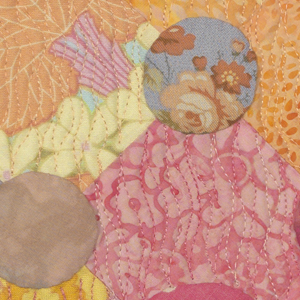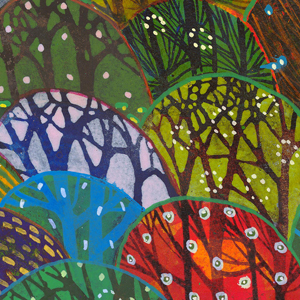
Good Politics
Fostering a Healthy Democratic Culture
David E. Campbell
Artwork: “Dawn” by Aniko Hencz © 2017
I teach a large lecture course on the state of American democracy, called “Keeping The Republic.” For the final lecture, I (half) jokingly tell my students that I am going to deliver a sermon. As a professor of Political Science, much of my class content is about the nuts and bolts of how American politics works (or not). That is, I generally strive to be neutral. There is one exception, however, as on one matter I am decidedly not neutral. I am an unabashed advocate for greater political engagement. But, as I preach in my sermon, engagement of a certain type: informed, impassioned, and civil.
To illustrate what I mean, I tell my students the story of the Vasa. This was a ship built by Sweden in 1628. At the time, Sweden’s King Gustavus Adolphus was determined to demonstrate his nation’s military power by constructing a mighty warship. But on its maiden voyage—a leisurely tour around Stockholm Harbor—the Vasa was caught in a high wind and sank, eventually disappearing into the silt at the bottom of the harbor. At least thirty people perished, likely including some family members of the crew who were aboard for this celebratory cruise. As you can imagine, this nautical debacle was a major embarrassment for Sweden’s king. (Today, the Vasa has been recovered and is on display in Stockholm).
Why do I tell a story about a Swedish ship in a course on American democracy? My point lies in the reason why the Vasa sank. Most experts believe that the ship did not have enough ballast. When the wind blew, it toppled over, quickly filled with water, and fell to the sea floor. I use the story of the Vasa to impress upon my students that they need to have enough “ballast in their bilge” so that they do not topple over when faced with high winds and choppy waters. In other words, they need to know what they believe. To do so, they need to clarify their own values—not just form opinions on the immediate issues of the day—but think about the principles that will guide them, whatever issues may arise.
I emphasize the need to clarify one’s own values because of the dangers of polarization. That word is almost universally used to describe the current state of American politics but in political science circles has a specific meaning, often described as “affective polarization.” In plain language, this refers to partisan animosity. Republicans dislike—and distrust—Democrats; Democrats feel the same way toward Republicans. And do not be mistaken, while many Americans describe themselves as independents, most of those alleged independents nonetheless have partisan sympathy toward one party and antipathy toward the other. I thus urge my students to be their own form of counterculture—to demonstrate that it is possible to be civically engaged without being politically polarized.
However, I worry that simply preaching the evils of polarization can result in a perverse unintended consequence: silence in the public square. While the public image of college students might be protests and encampments—and, certainly, campuses have their fair share of such activity—in my experience, most young people are often reluctant to share their views. They are especially reticent amidst peers whose views may differ from their own. There are many reasons for such reluctance to speak one’s mind. Most people are naturally averse to conflict in general, and politics specifically. Young people in particular are worried about how they are perceived by their peers, a worry that is no doubt exacerbated in a world saturated with social media. Because they are already predisposed to avoid contention, telling them about the problems of polarization may be “pushing on an open door,” giving young people all the more reason to give up on engaging in any kind of political discussion.
A major reason for the polarization we experience is precisely this reluctance to share one’s views. That may sound counter-intuitive. Isn’t the problem that too many people are sharing their opinions on everything all the time? Not exactly. Our hyper-connected world does allow for the near-constant expression of opinions, but rarely is this in the form of a dialogue among people who have differing views. First, it is rarely a dialogue. Posting on social media is often more like a monologue—or perhaps shouting into a void. Second, to the extent that there is any sort of back-and-forth, most people are only voicing their views within an echo chamber of the like-minded. To be clear, there is nothing inherently wrong with sharing political opinions among people who agree with you. The flip side of most people’s aversion to conflict is the appeal of comity. Talking about politics with co-partisans fuels the passion that is integral to political engagement. The problem occurs when people only ever converse with people who share the same views. They are not put through the refiner’s fire of articulating, defending, clarifying—perhaps even revising—what they believe. Furthermore, they are never confronted with the actual opinions of those on the other side. Instead, they are left with caricatures of what the other side believes, which in turn adds fuel to the fire of polarization. Can you believe that they think that?
My objective is to encourage students to have the ballast in the bilge so that they know what they believe, and are confident enough in that knowledge that they can discuss and debate those beliefs with others. When faced with the winds of political disagreement, they do not topple over and sink out of view. Instead, they engage with others. They are both informed and impassioned.
Fortunately, a recent survey of undergraduate students at the University of Notre Dame, where I teach, suggests that there is hope. Our students report discussing politics with others more often than the general population of the United States (that is, people of all ages). Roughly 60 percent of Notre Dame students say that they discuss politics at least weekly with people who share the same views, compared to just a third of all Americans. (Note that the survey was done in the spring of 2024, and thus well before the presidential election campaign was in full swing). While political disagreement is less common, compared to the population as a whole our students are also more likely to report weekly conversations with those who hold different views—34 percent vs. 18 percent. Where are those conversations taking place? By far, the most common response is with their friends. The least common? With their professors.
There is good news and bad news in these numbers. On the one hand, a majority of our students regularly discuss politics, and a sizable percentage even do so across lines of difference. That suggests that political discourse is not dead. On the other hand, though, conversations with professors are relatively rare. We in higher education can do more to engage our students in the sorts of conversations we want them to have.
This survey raises as many questions as it answers. Are Notre Dame students unusual, or would we find comparable results on other campuses? Hopefully, other institutions will survey their own students to enable that comparison. Whether at Notre Dame or elsewhere, further research is also needed to learn what these conversations are like. Are they heated arguments or are they civil? To be civil is the third dimension of the sort of engagement I preach to my students. Without civility, discourse devolves into ad hominem attacks. However, I fear that, like the emphasis on the problems with polarization, appeals for civility also run the risk of unintended consequences. Civility means treating your interlocutors with respect, and a willingness to learn from them—perhaps even to compromise. It does not mean, however, that compromise is always the answer. For some issues, it is simply not possible to find a position in the middle. Or perhaps it is theoretically possible but, owing to one’s convictions, not something on which you can, in good conscience, yield. This is why it is important to have ballast in the bilge. If you know your values, you can determine where compromise can be reached. Where compromise is infeasible, one needs to engage in persuasion. If persuasion fails, it is important to recognize the fundamental democratic principle of loser’s consent. Whether it is a policy debate, a piece of legislation, or an election, a democracy only functions when the losing side accepts its defeat, knowing that there will always be another debate, another bill, another election. After the 2020 election, we saw what happens when losers do not acknowledge their defeat. In the wake of the 2024 election, the nation has been spared the turmoil, and violence, from four years prior, but the question is what happens when the tables are turned in future contests. Which brings me back to my sermon. After telling my students that they should be informed, impassioned, and civil, I close with words that, appropriately, are widely used in theological circles, even if their origin has been lost to history.
In the essentials, unity.
In the non-essentials, liberty.
In all things, charity.
In a democratic context, these three statements remind us that there are essential rules and norms to which we can all agree; that a free society enables individuals to form their own views; and that a democracy will only endure if its members act charitably—civilly—with one another, including and especially those with whom they disagree.
Frankly, higher education has room for improvement in fostering a healthy democratic culture. While there are many exceptions, I nonetheless fear that too many professors do not encourage their students to put the ballast in their bilge and provide an example of political engagement that is informed, impassioned, and civil. The campus ought to be a place where young people learn how to discuss and debate from conviction—but without demonizing those who believe otherwise. I fear that the current climate has made that difficult. In this, our campuses reflect the broader culture of the nation. At a time when many Americans are losing confidence in higher education, one way to restore that confidence is to have our campuses model a different kind of culture, in which norms are agreed upon, informed opinions are exchanged, and civility prevails.
 David E. Campbell is the Packey J. Professor of American Democracy at the University of Notre Dame, and director of the university’s Democracy Initiative. He is the author of multiple books on civic engagement, including the forthcoming See Jane Run: How Women Politicians Matter for Young People (with Christina Wolbrecht).
David E. Campbell is the Packey J. Professor of American Democracy at the University of Notre Dame, and director of the university’s Democracy Initiative. He is the author of multiple books on civic engagement, including the forthcoming See Jane Run: How Women Politicians Matter for Young People (with Christina Wolbrecht).
Spring 2025
Part I: Defining Virtue
James Arthur
Dayna L. Cunningham
Greg Lukianoff
Najeeba Syeed
Interlude: Defining Moments
Part II: Defining Vocation
MORE
















